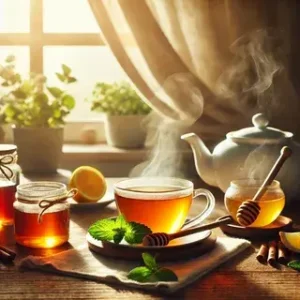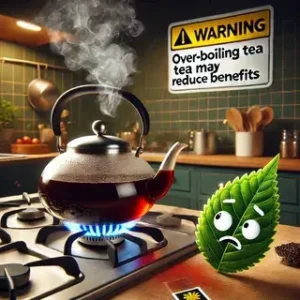Oolong tea is one of the favorite varieties among tea enthusiasts. It occupies a special position in the world of tea. The partially oxidized oolong leaves offer a complex flavor profile that bridges the gap between green and black teas. Its meaning is centuries long within the tea culture of places such as China and Taiwan, where it is not just for its flavor but also health.
In this article, we shall explain what oolong tea is, what amount of caffeine it contains, and the wonderful complexity of its flavors so you will have all you need to enjoy this fabulous tea.
What is Oolong Tea?
Oolong tea is a Chinese traditional tea that is produced from the leaves of Camellia sinensis, the same plant used for green and black tea. Oolong’s oxidation process sets it apart, which lies between green (unoxidized) and black (fully oxidized) teas.
This history runs deep in Chinese, especially in Fujian Province, where it was first cultivated. The name means “black dragon tea,” which is how it actually describes twisted leaves. Today, this art has been passed through generations and is celebrated in Chinese tea ceremonies for its aesthetic and sensory appeal.
Types of Oolong Tea
There are many varieties of oolong tea, each with distinct characteristics. Some popular types include:
- Tie Guan Yin (Iron Goddess of Mercy): Known for its floral aroma and sweet aftertaste.
- Da Hong Pao (Big Red Robe): Renowned for its rich, bold flavor and rarity.
- Milk Oolong: Famous for its creamy texture and natural sweetness.
These varieties showcase the diversity within the oolong category and highlight the craftsmanship involved in their production.
Caffeine Content in Oolong Tea
General Caffeine Range
Oolong tea contains a caffeine content between 30 and 50 milligrams for an 8-ounce cup, so it lies in the middle of other teas. Green tea typically has around 20 to 45 milligrams, while black tea contains about 40 to 70 milligrams of caffeine.
Determinants of Caffeine Content
Several determinants can influence the content of oolong tea regarding its caffeine content:
- Processing: The oxidation level of the tea will determine the caffeine content. More oxidized oolongs have a higher amount of caffeine.
- Steeping Time: Increased steeping time will have more levels of caffeine extracted from the leaves, making it stronger.
- Leaf Size and Amount: The tea leaves’ size and amount also determine the caffeine content.
Effects of Caffeine on Health
This oolong tea has a moderate intake, which is said to give one an assortment of health benefits such as alertness and improved metabolism. Nevertheless, one needs to take it responsibly because excessive consumption may lead to insomnia or an increased heart rate.
Taste of Oolong Tea
Oolong tea is famous for its rich and varied flavor profile. Depending on the type and preparation, you may experience notes such as:
- Floral: Fragile and fragrant, often found in lighter oolongs like Tie Guan Yin.
- Fruity: Bright, refreshing, and often reminiscent of the ripe fruit.
- Creamy: With a smooth buttery feel, it is a pure delight with varieties like Milk Oolong.
- Place: Environmental conditions surrounding the origins of the tea can contribute to its taste. Taiwanese oolong tea might be very sweet and smooth because of the climate and the nature of the land.
- Production: The technological processes with which the tea undergoes withering, rolling, and oxidation contribute to its flavor content. Traditional ones may allow deep and subtle flavors.
Health Benefits of Oolong Tea
Oolong tea, in addition to its rich flavors, also benefits the body. Below are some of the key benefits that make it a rich source in the diet plan:
Antioxidant property
Oolong tea has great antioxidant properties. Polyphenols are in the most concentrations, but there is much more involvement in fighting against oxidative stress in the human body. The other activity for free radicals’ neutralization may contribute to or inhibit chronic diseases from manifesting, therefore keeping the body healthy. Cellular and Immune health: Constant intake of oolong tea can preserve an overall healthy immunity system while bringing cellular wellness.
Ability to aid Weight Loss
Scientific discoveries have been observed using oolong tea, which helps humans manage body weight. It was recognized that a process of increased fat oxidation existed due to these polyphenols in oolong. As oxidation and metabolic rates can increase by consumption of the above-mentioned beverages, oolong tea helps in weight loss, as described above.
Effects on Heart Health
Oolong tea has been linked to several heart health benefits. Regular consumption may help lower cholesterol levels, particularly LDL cholesterol (the “bad” cholesterol), and improve overall cardiovascular health. The tea’s anti-inflammatory properties may also contribute to better blood circulation, reducing the risk of heart disease and stroke.
Other Health Benefits
Beyond its antioxidant and weight management properties, oolong tea offers several additional health benefits:
Dental Health: Oolong tea has antibacterial properties that can help reduce plaque formation and support oral health, potentially lowering the risk of cavities and gum disease.
Skin Health: The antioxidants in oolong tea may help improve skin complexion and prevent signs of aging by combating oxidative stress.
How to Steep Oolong Tea
The correct way of steeping oolong tea will enable you to reap all the drink’s flavor. Here’s how you do it:
Recommended Brewing Instructions
Temperature: Brew with hot water at about 190°F to 200°F (88°C to 93°C). This would permit the tea leaves to unfurl and the flavor to release but not the bitterness.
Steeping Time: Steep oolong tea between 3 to 5 minutes. In fact, your taste or the type of oolong may also dictate its steeping time. Lighter oolongs require lesser steeping times, while more intense varieties could be given a longer infusion time.
Tips to Enjoy the Best Taste
- Quality Leaves: You use the best loose-leaf oolong tea for the best taste and aroma.
- Preheat Your Teapot or Cup: Preheat your teapot or cup by rinsing it with hot water before brewing. This keeps the temperature throughout the steeping.
- Steeping Time: Change the steeping time according to your taste. You can steep oolong tea several times. The flavor changes each time you infuse.
Oolong Tea in Comparison to Other Teas
Oolong tea stands in a class by itself within the tea market. The characteristics and distinct differences that separate it from green and black teas set it apart.
Comparison of Oolong Tea, Green Tea, and Black Tea
- Oxidation Level: Oolong tea is partially oxidized. This puts it in between unoxidized green tea and fully oxidized black tea. This provides oolong with a wide spectrum of flavors ranging from very light and floral to strong and toasty, depending on the variety.
- Caffeine Content: Generally, oolong tea contains higher levels of caffeine than green tea but less than black tea, making it a mid-range option for those searching for a balanced energy-boosting experience.
What Makes Oolong Different
Flavor Profile Complexity: Unlike green and black teas, oolong tea goes through unique methods of processing that make flavor profiles so complex and ever-changing through multiple infusions, thereby giving a distinct sensory experience.
Health Benefits: All types of tea may have health benefits, but oolong tea offers a unique benefit. These specific compounds blended with antioxidants could help lose weight and regulate blood pressure to maintain heart health better than others.
Conclusion
Oolong is an interesting drink- half green and half black with unique flavor characteristics. The history of this kind of cultural value in the grand scheme of drinking tea will surely sustain the appeal for interested people who want such drinkability.
Moderate in the degree of caffeine, promoting a balance in weight and heart health in an individual, oolong stands out as a desirable healthy option for the thirsty lover of tea. Regardless of how you enjoy it – through its taste or numerous health advantages – oolong tea is definitely worth integrating into your daily life.
Now, explore this special tea’s myriad forms, brewing techniques, and health benefits to realize more of what oolong has in store.
FAQ About Oolong Tea
- What is oolong tea?
Oolong tea is an intermediate between unoxidized green and black tea, fully oxidized-between flavor, color, and caffeine content. It comes in a complex range of tastes and smells, from floral and fruity to rich and creamy. - How much caffeine is there in oolong tea?
The amount of caffeine found in oolong tea generally ranges from 30 to 50 milligrams within an 8-ounce cup, less than what is found in black tea but more than that which is found in green tea. Depending on the specific type of oolong or brewing method, levels could vary. - Health benefits of oolong tea?
Oolong tea is full of antioxidants, and several health benefits such as heart health improvements, weight management, and improved skin health may also be provided. It helps improve your dental health because of its antibiotic feature. - How can I prepare oolong tea?
Use water at a temperature of about 190°F to 200°F, or 88°C to 93°C and then steep the leaves in a cup for 3 to 5 minutes to brew oolong tea. You may be able to adjust your times too steep according to what you like and according to the type of oolong. - Can you steep oolong tea over and over again?
Yes, oolong tea can be steeped many times. Each infusion yields a different flavor profile. You could experiment with steeping times to deepen your experience and uncover the complexity of the tea. - Can oolong tea be consumed every day?
Oolong tea can be taken a little every day in a balanced diet. However, high sensitivity to caffeine may raise the intake level. Before taking any kind of special diet, it is prudent to consult a health physician if one has certain sensitivities or conditions.





Someone essentially lend a hand to make seriously posts I’d state. This is the very first time I frequented your web page and thus far? I surprised with the analysis you made to create this particular publish amazing. Wonderful job!
I抦 now not certain where you are getting your info, however good topic. I needs to spend a while studying more or understanding more. Thanks for magnificent information I used to be in search of this info for my mission.